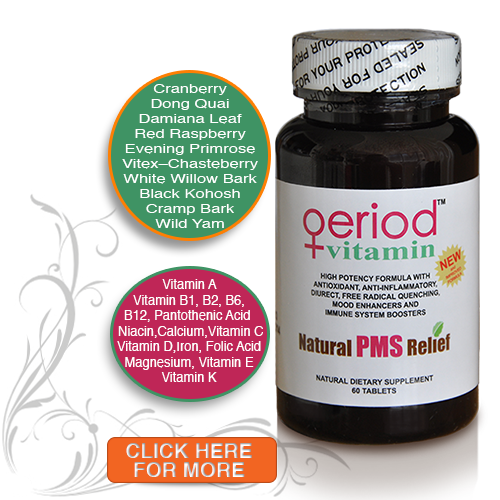The next time you hear a news report that vitamins don’t work, know that they’re not talking about the answer to the question, do vitamins help with PMS cramps? Or the question does vitamin B help with menstrual cramps? What they’re looking at is overall health, not the specific application of vitamins and minerals for health.
Women Regularly Take Vitamins for Menstrual Cramps
 Thousands of women will tell you that they took or take vitamin E, vitamin B12, vitamin C, vitamin D, or other herbs or vitamins for menstrual cramps. And it works for them. Are they lying? Do you need to prove in a study that these supplements work?
Thousands of women will tell you that they took or take vitamin E, vitamin B12, vitamin C, vitamin D, or other herbs or vitamins for menstrual cramps. And it works for them. Are they lying? Do you need to prove in a study that these supplements work?
Now here’s a fact that a lot of people don’t understand about vitamins and minerals: they only work when you need them. This is why many researchers make incorrect conclusions about their studies on vitamins and minerals.
Vitamins and minerals will never give you superhero strength or stamina; they’ll only replace what you’re lacking or give you what you need today, and that’s where the difference comes from.
It’s the same thing for vitamins for menstrual cramps. If you’re deficient in the ones you take, you’ll most likely find relief for menstrual cramps. However, the more deficient you are, the longer it could take for you to feel better.
What Happens in a Vitamin Or Mineral Deficiency
When you have a vitamin deficiency, you’ll start to notice little things wrong with your body. Maybe your nails will crack and split, a sign of a calcium deficiency. Or your lips will chap at the least little wind, a folic acid and B vitamin deficiency. Or your skin will break out, a sign of a zinc deficiency. Or you’ll have cramps during your period, a sign of possible multiple deficiencies.
How to Overcome a Vitamin or Mineral Deficiency
Let’s face it, it’s hard to get all the vitamins and minerals you need in one day without taking a period vitamin or vitamin and mineral supplement. In every nutritional study, no matter what the demographic group was that was studied, multiple deficiencies of the participants were found when looked for. To relieve the symptoms of a vitamin and mineral deficiency, you have to take the natural vitamin and/or mineral you are low in.
Why You Can’t Depend On Foods to Overcome a Vitamin Deficiency
 Don’t think that you can eat your way out of a deficiency; the levels you would have to eat of foods high in the nutrient would surely pack on pounds! Some nutrients have to be supplemented 100 times the normal amount to make up for a deficiency.
Don’t think that you can eat your way out of a deficiency; the levels you would have to eat of foods high in the nutrient would surely pack on pounds! Some nutrients have to be supplemented 100 times the normal amount to make up for a deficiency.
Thus, what vitamins to take for menstrual cramps really depend on supplying all of them that are necessary for you during the menstrual time of month. You’ll need extra iron because you’re losing iron in your blood flow. Interestingly, most vitamin and mineral supplement companies are afraid of putting iron in – and this tells you they aren’t for you! This is why you need a period vitamin.
Or better yet, see a professional nutritionist who can test you for vitamin and mineral deficiencies and tell you exactly how much you should take of each.
Vitamins for menstrual cramps start with a foundational formula of calcium, magnesium and omega-3, but vitamin A, C, E, D, K, and B vitamins are also important to prevent cramps. The best vitamins for period cramps are ones that supply all of them you need and then let your body decide what to save and what to discard. All vitamins and minerals interact with each other; this is another reason why you need all of them.



